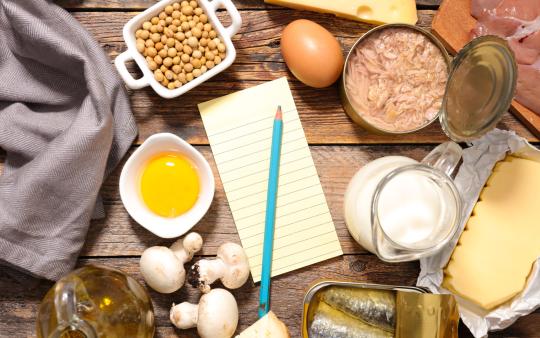Vitamin D is a bit of a misnomer because it is actually a hormone. Our bodies produce it when exposed to the sun’s ultraviolet light and we can get some vitamin D from certain foods. If you live in the northern hemisphere, you are probably familiar with the long dark winter months and as the days get shorter, vitamin D deficiencies are more common. Understanding that vitamin D is a hormone can bridge the connection between deficiencies and mental health issues like depression, which can increase during the darker months. Hormones influence our mood, so it is essential to incorporate more vitamin D-rich foods in your diet this winter.
Get tested
A simple blood test can tell you if you are absorbing an adequate amount of vitamin D. People with certain medical conditions, including osteoporosis, rickets, malabsorption syndromes, renal diseases and patients on medications that affect vitamin D metabolism, are especially vulnerable to deficiency. Women who are trying to get pregnant should also be aware of the impact of vitamin D on fertility.
Vitamin D-rich foods
Whether you have a deficiency or not, you can eat vitamin D-containing foods to help maintain healthy levels through the winter.
Mushrooms
Mushrooms naturally produce vitamin D when exposed to sunlight. Keep in mind that not all mushroom producers will expose harvested mushrooms to sunlight. To ensure your mushrooms contain dietary vitamin D, place them on a tray gill side up in direct sunlight for one hour before consuming.
Fatty fish
Incorporate a selection of omega-3-rich fatty fish to your diet including wild salmon, sardines, trout, mackerel and cod. Studies indicate that wild fish have greater levels of vitamin D than farmed fish. Always read labels and talk to the person at the seafood counter to understand which is the most suitable option for you.
Eggs
Eggs are an easy way to obtain vitamin D, being such a versatile ingredient. Note that vitamin D is concentrated in the yolk. A runny yolk contains more available vitamin D then a firm yolk. Good egg options include sunny side up, soft boiled and poached. Egg yolks can also be enjoyed as a homemade mayonnaise. Try adding an egg yolk to your morning smoothie. Always purchase local, free-range certified organic eggs.
Fortified foods
Many foods are fortified with vitamin D2. This includes most dairy products (milk and cheese), some dairy alternatives, cereals, processed foods, and even some brands of juice. If you are ever unsure, check the nutrition panel on the product and it will tell you the daily value per serving size.
Supplementation
Even if you consume a variety of fortified foods, you may wish to consider supplements during periods with less exposure to direct sunlight. Health Canada recommends anyone from 2-50 years in age take an additional 200IU of vitamin D3 daily. People over 50 are recommended to take a minimum of 400IUs daily in addition to a healthy amount derived through dietary sources.
D2 vs D3
It is important to understand that there are different forms of vitamin D. Most commercial supplements come in two forms, either D2 (ergocalciferol) or D3 (cholecalciferol).
Vitamin D2 is made from yeasts or other plant-based ingredients. This form is most commonly used to fortify processed products. Many experts believe vitamin D2 is not absorbed as well as D3, the exact form found in the body.
Vitamin D3, on the other hand, is derived from either fish oil or sheep’s lanolin, a waxy substance secreted by the glands found in the sheep’s skin. It is the preferred form of supplementation, unless you wish to accommodate any personal dietary restrictions.






